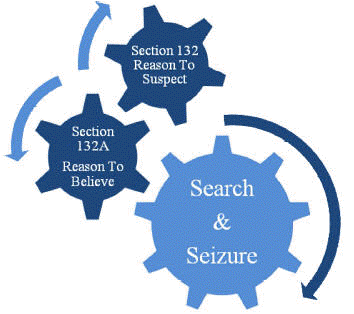Section 132A of the Income Tax Act is a powerful tool in the hands of tax authorities, allowing them to requisition assets, books of accounts, and documents held by other legal authorities. This section is often invoked in cases where assets or information could reveal undisclosed income or property that was not reported for tax purposes. Here’s a comprehensive guide to understanding the powers under Section 132A, the requisitioning process, key amendments, and judicial interpretations.
1. What is Section 132A of the Income Tax Act?
Section 132A empowers high-ranking income tax authorities, such as the Principal Director General or Principal Commissioner, to authorize requisition of books, documents, or assets that might be relevant for tax assessments or investigations. These requisitioned items are typically in the custody of other authorities, such as Customs or Sales Tax departments, under various laws.
This section serves as an essential tool when:
- Tax authorities have reason to believe that the documents or assets are related to undisclosed income.
- The summoned party has failed to produce documents or assets required for an investigation under the Income Tax Act.

2. Key Scenarios for Requisition Under Section 132A
The section allows tax authorities to initiate requisitions under the following conditions:
- Failure to Produce Summoned Documents: If a person has been issued a summons to produce documents under Section 131 of the Income Tax Act but has failed to comply, and those documents are now held by another authority, the requisitioning officer may retrieve them.
- Future Use in Proceedings: If the requisitioned documents will be helpful or relevant to an ongoing or future tax proceeding, and there’s a likelihood that the person summoned may not voluntarily provide them.
- Undisclosed Income or Property: If there is evidence suggesting that the assets or property represent undisclosed income, which has not been reported to tax authorities, and these assets are in custody of another legal authority, tax authorities may requisition them for further investigation.
3. Requisition Process: How Does It Work?
Once the tax authority (Principal Director General, Principal Commissioner, etc.) records the reason to believe that assets or documents need to be requisitioned, they can authorize a designated officer (such as an Additional Director or Deputy Commissioner) to demand delivery of these assets or documents.
Upon receiving such a requisition, the custodian authority must hand over the requested documents or assets:
- Immediately: If they no longer need them for their purposes.
- At a later stage: Once they determine that it’s no longer necessary to retain them.
4. Applicability of Section 132 Provisions
After requisition, the items are treated as if they were seized under Section 132. The requisitioning officer gains the authority to use provisions of Section 132(4A) to Section 132(14) and Section 132B, treating these requisitioned assets as seized under the Income Tax Act.
For example:
- Assessment Procedures: The seized assets can be assessed for tax evasion.
- Confidentiality of Reasoning: The reasons for requisition, as recorded by tax authorities, need not be disclosed to the affected person, maintaining investigation confidentiality.
5. Important Amendments to Section 132A
Over time, several amendments have clarified and expanded Section 132A. Some notable amendments include:
- The Finance Act, 2017: Inserted an explanation that authorities are not required to disclose reasons for requisition to the individual, preserving investigative confidentiality.
- The Finance (No. 2) Act, 2014: Expanded the scope of officers who can authorize requisitions, including Additional Directors and Additional Commissioners.
- The Finance Act, 2009: Applied amendments with retrospective effect from June 1, 1994, affecting how requisitions are processed for earlier assessment years.
Legislative History and Relevant Circulars
The history of Section 132A is rich, with numerous amendments over the years. For instance:
- Circular No. 179 (dated September 30, 1975): Initially introduced the concept of requisitioning documents held by other authorities.
- Circular No. 10 of 2012: Provides special provisions for requisitions during elections, ensuring that requisitioned assets relate to election activities and are not misused.
6. Judicial Interpretation: Key Cases Related to Section 132A
The judiciary has played a role in interpreting the requisition powers under Section 132A. One of the landmark cases is Manju Tandon v. T.N. Kapoor (1978), where the court ruled that requisitioning is only valid if there is sufficient evidence that the assets represent undisclosed income. In this case, the court found that there was not enough reason to believe that the gold ornaments held by the Central Bureau of Investigation (CBI) were unreported assets, thus invalidating the requisition.
Key Takeaway from Judicial Rulings:
Requisition orders must be backed by credible evidence that assets are related to undisclosed income or property; otherwise, they may be invalidated by the courts.
7. Special Provisions During Elections
During elections, requisition powers under Section 132A are subject to additional scrutiny. Circular No. 10 of 2012 specifies that requisitions made in election-sensitive areas or periods must meet stringent criteria:
- The search or requisition should relate to an electoral constituency under the Representation of the People Act, 1951.
- The requisitioned assets must be related to election activities.
- Evidence must be provided that the requisition is necessary and not redundant for previous assessment years.
Frequently Asked Questions (FAQs)
Q1. Can the reason for requisitioning documents be challenged? No, as per the 2017 amendment, the reason to believe that requisition is necessary need not be disclosed to the taxpayer, making it difficult to challenge.
Q2. Who is authorized to requisition documents under Section 132A? Principal Director General, Director General, Principal Commissioner, or Commissioner can authorize requisitions. Designated officers like Additional Directors, Deputy Commissioners, etc., are empowered to execute the requisition.
Q3. What happens after the requisition is made? The requisitioned items are treated as if they were seized under Section 132, allowing authorities to initiate further investigations or assessments.
Q4. Can requisitions be made for election-related investigations? Yes, special provisions apply to requisitions during elections, ensuring they are relevant to electoral activities and not politically motivated.
Conclusion
Section 132A of the Income Tax Act is a significant tool for tax authorities to prevent tax evasion and uncover undisclosed income. By requisitioning assets held by other authorities, income tax officials can gather crucial information for assessments. However, the requisition process under Section 132A also comes with checks, particularly judicial oversight and specific conditions during elections. This balance helps ensure that requisitions are used judiciously and legally, protecting taxpayer rights while allowing authorities to maintain tax compliance.
For more detailed information on income tax procedures, compliance, and other sections, visit SmartTaxSaver.com, where we provide in-depth resources on tax laws and guidance on legal tax practices.



